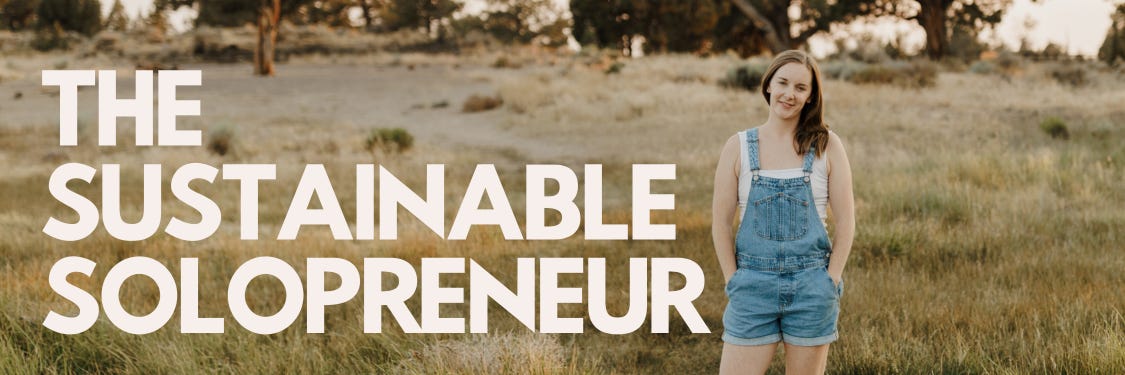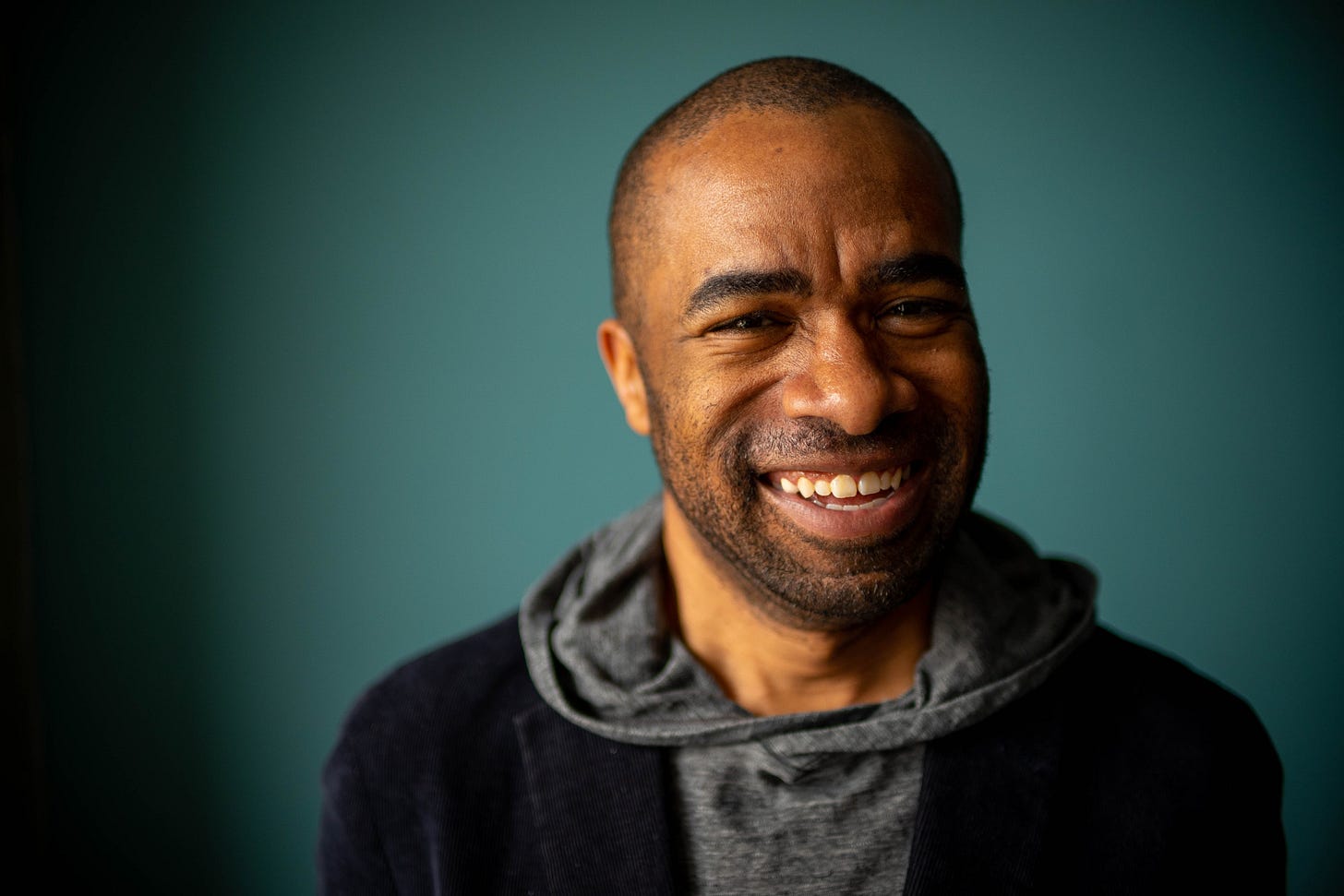The Sustainable Solopreneur is a weekly newsletter about seasonal, cyclical, supportive business strategy for solopreneurs and creative souls who want more out of life than the status quo, hosted by business coach and strategist Jenni Gritters. If you’ve been reading this newsletter for a while and you receive value from it, I’d encourage you to sign up for a paid subscription.
💰Have you signed up for my free masterclass yet? Next Monday, I’m offering an End of Year Financial Checklist workshop, sponsored by Lettuce. We’ll walk through 6 questions to ask yourself about your business, pricing and financial systems. You in?
I first met Damon Brown about three years ago, when we were on a "Parenting & Freelancing” panel together. Damon is a coach, author, teacher and the founder of several businesses. He’s also the primary parent for his two sons. During that panel, I was immediately drawn to his approach to entrepreneurship: He preached making it a long game. He talked about how challenging it was to juggle multiple things — and how important constraints were for getting clear on what matters most to you.
After that session, I hired Damon as my coach. He helped me walk through a really challenging season of building my business while pregnant with my daughter (and incredibly ill). And he continues to inspire me with the ways he approaches work and life with gentleness, intention and intelligence.
Today, meet Damon:
How would you describe your work?
I help side hustlers, solopreneurs, and other non-traditional entrepreneurs bloom. They often have the vision and the passion, but may not have the tools to build their confidence, EQ, or business strategy effectively. My goal is to create a safe emotional space for them to see and declare their truth and, by proxy, shine a light for their community.
What is one of your "third ways" of working, that feels unique compared to how others have done it?
When I first started coaching, I thought I was a facilitator to my client’s growth. Like a mentor. Then I realized what I was doing was actually emotional labor, helping my client unpack their own previously invisible blocks, and that inevitably led to some belief they didn’t even realize they accepted as truth. Sometimes that belief came from trauma. Sometimes that belief came from systemic pressure. But it was a core, foundational, and often unconscious idea that capped their growth.
I remember the first time one of my clients started crying. Whatever we discovered was so raw, so real, like a fresh scab being exposed to air. I found myself tearing up and quietly holding a space for them. After that moment, our ability to show up was even deeper.
Now I recognize that I don’t facilitate the transformation of my client, but I walk with my client on their journey, and we, together, become transformed. It is a subtle, but powerful difference that made me do more impactful coaching.
This is my third way.
You've taught me a lot about choosing slow business growth intentionally, and seeing slow progress as a win. Can you tell us more about what it looks like to embrace slow growth? How has that shown up in the businesses you've launched?
Wonderful to hear!
On my journey, I’ve focused on impact rather than time. When I bootstrapped my first startup, an app called So Quotable, my co-parenting partner had just finished maternity leave and I was home alone with our 3-month old. I literally could not give the startup my all, as I was on duty from 6 am to 6 pm. So I had to design for depth: What could I do within a 15-hour-a-week window comparable to what my well-resourced, single, childless contemporaries? I had just moved from Silicon Valley as a reporter, and knew that the six months it took for me to launch the app would be six weeks for my colleagues and six days for my startup veteran friends. That’s where I had to make peace.
I had to gently remind myself that my goal wasn’t to get it done as soon as possible, as there would inevitably be more mountains to climb afterward, but to create a manageable, sustainable pace. In the decade since I created another startup that became the number one app and was acquired, called Cuddlr, several business books, a business coaching practice, and BringYourWorth.tv approaching now 400 episodes. Imagine if I burnt myself out back in 2014?
When it comes to pacing, how do you slow yourself down on purpose? What does that look like in the moment?
Kids help. So does health. The most important tool, though, is silence.
If you get quiet enough, you can hear what your body and intuition are telling you. This is the focus of my practice, both on my personal journey and in my coaching. When we find ways to be present, like allowing a moment of joy, surrounding ourselves with nature or peace, or taking a breather or quick nap, then we get still enough to hear our next move - or to hear that we shouldn’t make a move right now.
I have a good friend that works with the body. They talk about how we can suddenly feel cranky or mean or sad. We might catch ourselves here or we may have someone else tell us how we’re showing up. And if we pause for a moment and check in with ourselves, we may realize that we have a slight headache or that we’re really thirsty or that we are more tired from yesterday than we realized. We just didn’t notice until we checked in.
I believe it is the same with our career. We can realize when it is becoming too much or too little. The key is to get still enough to hear our own intuition. The second step after that is to trust it and act on it.
Unfortunately, we can distrust our instinct and not act if it goes against our ingrained, often invisible beliefs that we’ve actually outgrown.
This is where my work begins.
How have you benefited from choosing a unique way of working and living?
I can’t be fired. My actions, my beliefs, and my purpose overlap in a near-perfect Venn diagram. And I own my intellectual properties, so I can create, sell, and expand in ways that are always best for me and whom I serve.
What would you tell someone who's feeling like the "standard" ways of running a biz don't apply to them?
Trust your curiosity. Explore before others see the path. Follow your nose. And facilitate an environment that matches your impact.
For my most impactful clients and even for myself, they started creating where they thought there was a need often unseen by the masses. It’s planting a seed when you know the sun will hit it much later. We are subject-matter experts for our specific communities, and, for many of us, our specific communities are not being served as well as they should be. So we already know what needs to be done. And waiting for permission will either leave your community underserved, keep you playing small, or both.
You deserve more, and so do they.
To hear more from Damon, subscribe to his weekly newsletter here.
Curious about my (Jenni’s) background? I’m a writer and business coach living in Central Oregon. My goal is to teach everyone who will listen that it’s possible to build a simple, stable, successful business that support your human needs first. Join my group coaching program, SUSTAIN, for more conversations like this (and a community of people who are all about the path less taken), and follow me on Twitter & Instagram.






This was such an awesome read 😍 inspired!!
Thanks, Jenni! Couldn't be happier to see the impact you're now making.